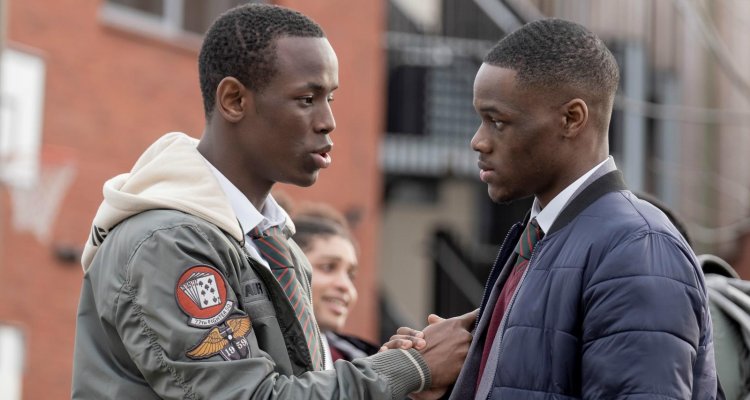Who could have guessed that U.K. rapper, Rapman (a.k.a Andrew Onwubolu), would direct one of the year’s finest films? Set against the backdrop of gang wars in South-East London, “Blue Story ” is a cautionary tale of two young men—Timmy and Marco—who are best friends and future cross-town rivals. Love, loss, family, and friendship ferociously collide in between, without distracting us from either its fun or energy. It’s a balancing act only a rapper could pull off.
While hip-hop usually gets a bad reputation for aggressive lyrics, there’s a brilliance to the way artists like 2Pac rhyme simmering anger with light banter. “Blue Story” brings a similar edge to the table, letting us know how crazy life is for these men from the start. “21 teens have been murdered,” a newscast announces over a blank screen. “Knife crime in London is up 34 percent.” Much of the intro cross-cuts between violent archival footage and Timmy (Stephen Odubola) and Marco (Michael Ward) growing up, a contrast between youthful innocence and cyclical violence that pulses through the film. Now, they attend high school in Peckham, living in neighborhoods divided by gang warfare. It’s a dangerous life for these locals, who are dealing with the worst police response times in movie history (gangs can apparently start shootouts without any civic interference). And staying out of trouble isn’t easy.
The movies have been down this road before, most notably in John Singleton’s “Boyz n the Hood.” Rapman must have been taking notes: His film does for London what Singleton did for Los Angeles. With a vivid sense of place, you can smell the beef cooking from the brick apartments; feel the tension in the streets; hear the sirens blaring blocks away. A party sequence with neon lights is especially immersive. As Timmy makes eyes with his crush, Leah (Karla-Simone Spence), Marco has already danced with multiple girls, leading to more than a few thrown punches (“Best party ever!” Marco exclaims). But visuals are only a feature on this bracingly lyrical production.
In addition to directing, Rapman wrote the script, as well as composed the Greek chorus, rapping commentary about events on screen as they take place. It’s an ambitious decision, especially as critics complain about blockbusters becoming more and more like music videos. But here it’s less a superficial conceit than it is a compliment to Rapman’s distinct style; the lyrics about violence being pointless gives “Blue Story” the feel of a Nas ballad. Later, when one of Timmy’s friends beats up Marco for no reason, a nasty ripple effect turns the two into Shakespearean rivals.
As things spiral out of control, the cumulative emotional power builds like a beat ready to drop, and when it does, you don’t want to be in the crosshairs. Neither Timmy nor the audience has forgotten those early days playing soccer with Marco or those convincing scenes where, after a day hanging out, the boys return home to their loving families. So it’s devastating when lives are lost—by gun, knife, or brick—over turf that isn’t even owned by those fighting.
In Timmy, Odubola goes from shy, sympathetic teen to starving war criminal so effortlessly you might think they switched actors midway through. When he loses a close friend at Marcos’ hand, his turning on friends and morals is understandable. Ward nails the part of Marco; his descent into panic mirroring an increasingly dark tone.
What’s the point in all this violence? What are people dying for? These are questions that interest Rapman and the performances are sharp enough to draw answers. To see Rapman match the cast’s energy not just musically, but through quick cuts, electric camerawork, and lively, culture-distinct patios is wonderful to behold. It’s as if he’s rapping his dialogue. Oh wait, he is. [B+]

